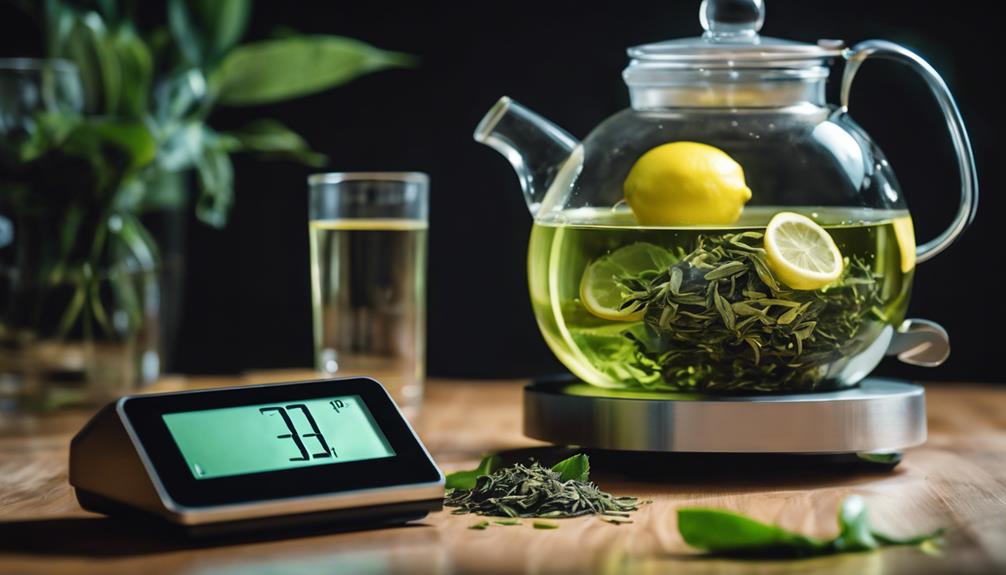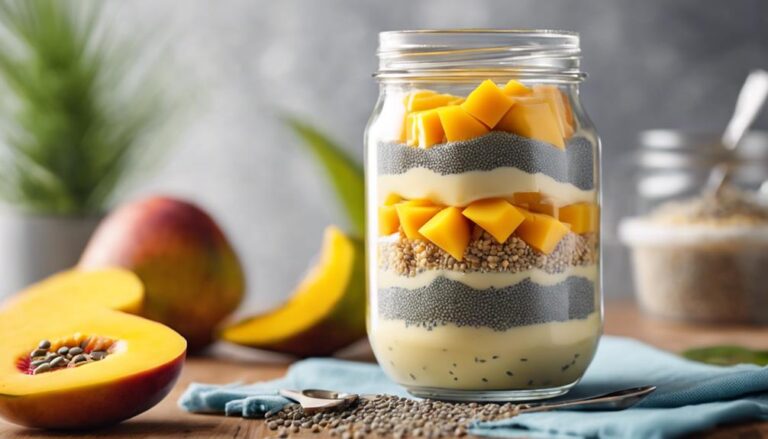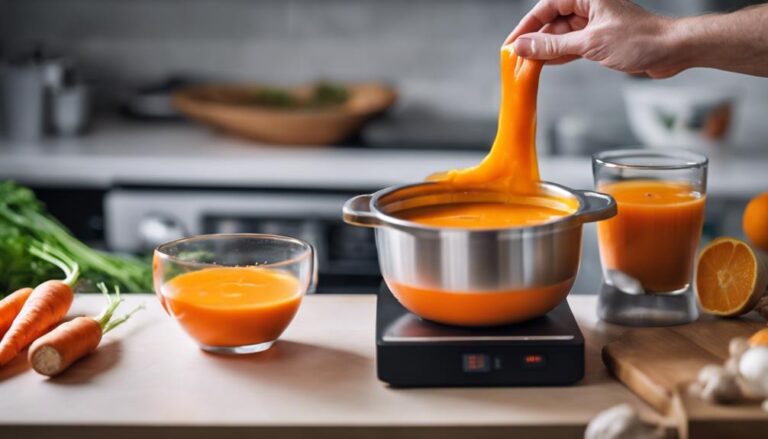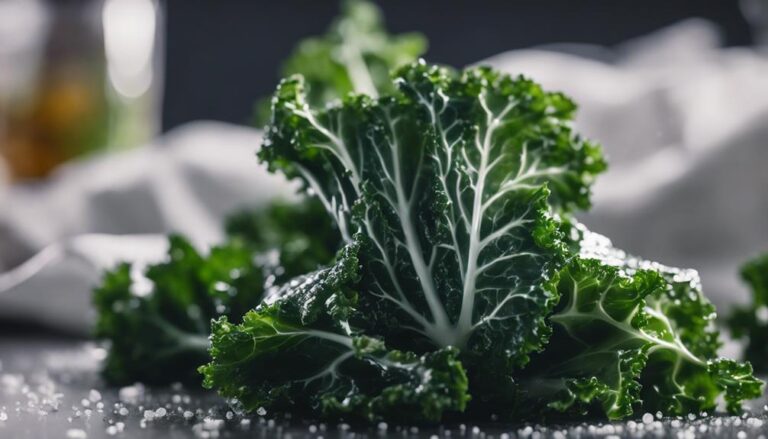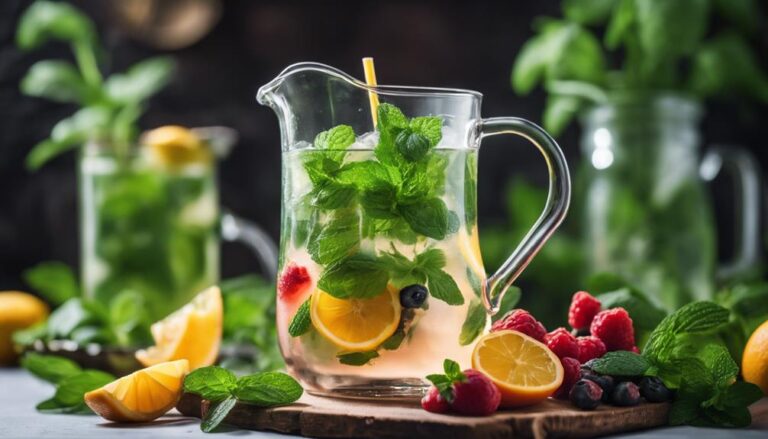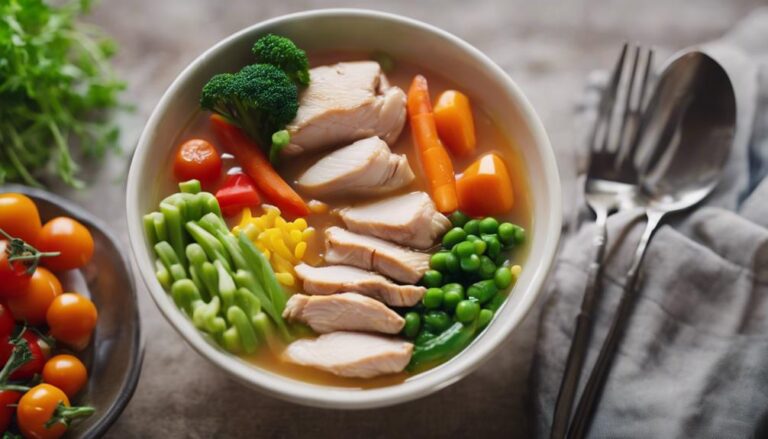Drink Sous Vide Green Tea With Lemon for the 1200 Calories a Day Diet
To enhance your 1200 calories a day diet, try sous vide green tea with lemon. This invigorating combo offers a revitalizing, low-calorie drink that aligns with your dietary objectives. Green tea's antioxidants boost metabolism, while lemon adds vitamin C for digestion and hydration. This fusion strikes the right balance of taste and health benefits. Curious to know more about this nutritious drink?
What You Will Learn Here
- Sous vide green tea with lemon can be a low-calorie addition to a 1200 calories a day diet.
- Green tea aids in metabolism, while lemon provides Vitamin C and helps with digestion.
- Matcha and lemon fusion offer antioxidants, boost metabolism, and provide hydration.
- Enjoy a lemon matcha latte for a flavorful, low-calorie beverage option.
- Control water temperature and steeping time for optimal green tea brewing to extract health benefits.
Tea's Evolutionary Origins
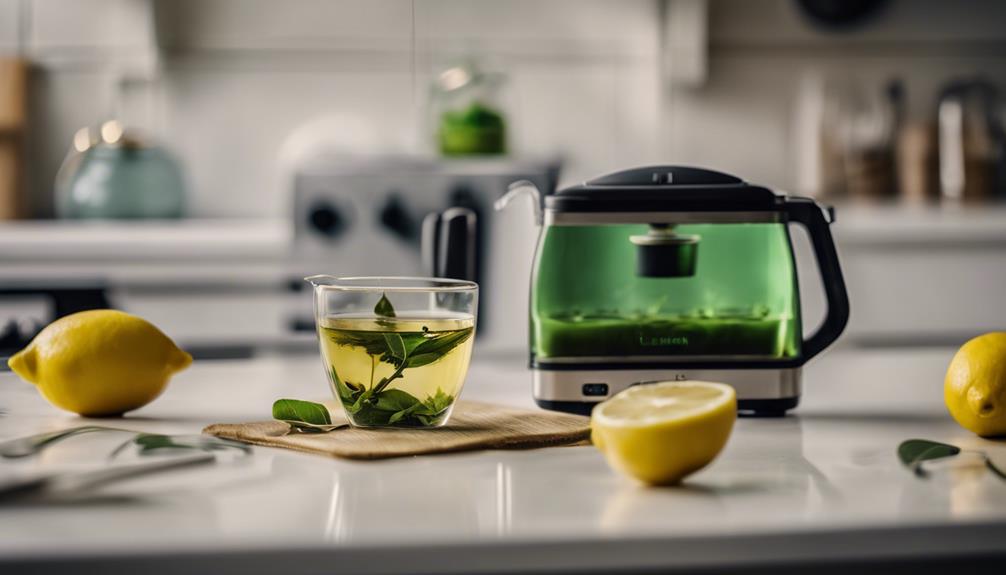
Tea's origins trace back to ancient times when it was discovered in China.
This beverage holds great cultural significance worldwide, with rituals and traditions evolving around its consumption.
Today, tea has adapted to modern tastes and lifestyles, offering a variety of flavors and blends to suit different preferences.
Tea's Ancient Roots
Throughout history, the origins of tea can be traced back to ancient times when the plant was first discovered and cultivated. Tea's journey began with ancient rituals in China, where it was initially used for medicinal purposes before evolving into a beverage consumed for pleasure.
The cultivation and brewing of tea eventually spread to neighboring countries, becoming an integral part of global trade.
Tea's ancient roots are intertwined with stories of emperors and monks cherishing its calming properties and unique flavors. As trade routes expanded, tea found its way to different parts of the world, each region adding its own twist to the brewing process.
The ancient traditions surrounding tea ceremonies reflect the respect and reverence people held for this cherished beverage.
From China to Japan, India to England, tea's global presence today is a testament to its enduring legacy that started with ancient rituals and global trade. Embracing the history and cultural significance of tea can deepen your appreciation for this beloved drink.
Tea's Cultural Significance
Discover how tea's cultural significance has evolved over time, shaping rituals and traditions worldwide.
Cultural practices surrounding tea have deep historical roots, influencing social interactions and ceremonies in various societies.
Tea ceremonies in Japan, for example, reflect harmony, respect, purity, and tranquility. In China, tea isn't just a beverage but a symbol of hospitality and friendship. The British have their famous afternoon tea tradition, a social custom dating back to the mid-19th century.
Tea's cultural significance extends beyond mere consumption; it's intertwined with spiritual practices, meditation, and relaxation techniques.
Throughout history, diverse cultures have attributed health benefits to tea, ranging from boosting immunity to aiding digestion. The antioxidants in tea are believed to promote overall well-being and longevity.
As you explore the world of tea, you'll find that its cultural significance isn't limited to taste but encompasses a rich tapestry of traditions and practices that have stood the test of time.
Tea's Modern Adaptations
Incorporating innovative techniques and ingredients, tea has undergone a transformation from its ancient roots to adapt to modern tastes and lifestyles. To keep up with the ever-evolving preferences of consumers, tea has seen a surge in modern innovations and adaptations. With health trends on the rise, teas are now infused with a variety of beneficial ingredients like antioxidants, vitamins, and herbs to cater to the wellness-seeking crowd.
Tea companies are exploring new ways to enhance the traditional tea-drinking experience, such as introducing convenient ready-to-drink options, tea blends tailored for specific health benefits, and even tea-based energy drinks. These adaptations not only make tea more appealing to a wider audience but also provide added convenience for those with busy schedules.
From matcha lattes to herbal tea infusions, the modern tea landscape offers a diverse range of options to suit different tastes and health goals. Embracing these modern adaptations allows tea enthusiasts to enjoy their favorite beverage in innovative ways that align with their lifestyle choices and health preferences.
Tea Varieties and Benefits
Explore a variety of tea options and their associated health benefits to enhance your understanding of the impact on your diet. When choosing teas for your 1200 calorie a day diet, consider the health benefits and flavor profiles to make the most of your choices.
Here are some popular options for you:
- Green Tea: Known for its high antioxidant content, green tea can aid in metabolism and weight management. Its invigorating and grassy flavor profile makes it a revitalizing choice for any time of the day.
- Black Tea: With its bold flavor and moderate caffeine content, black tea can provide an energy boost while also supporting heart health due to its antioxidants.
- Herbal Tea: Herbal teas come in various flavors such as chamomile, peppermint, or ginger. Each herbal tea type offers unique benefits, from aiding digestion to promoting relaxation.
- White Tea: Delicate and subtle in flavor, white tea is high in antioxidants that can help protect your skin and improve overall health.
- Oolong Tea: Falling between green and black teas, oolong tea offers a balance of flavors and health benefits, including potential weight management support and improved mental alertness.
Green Tea Infusion Ideas
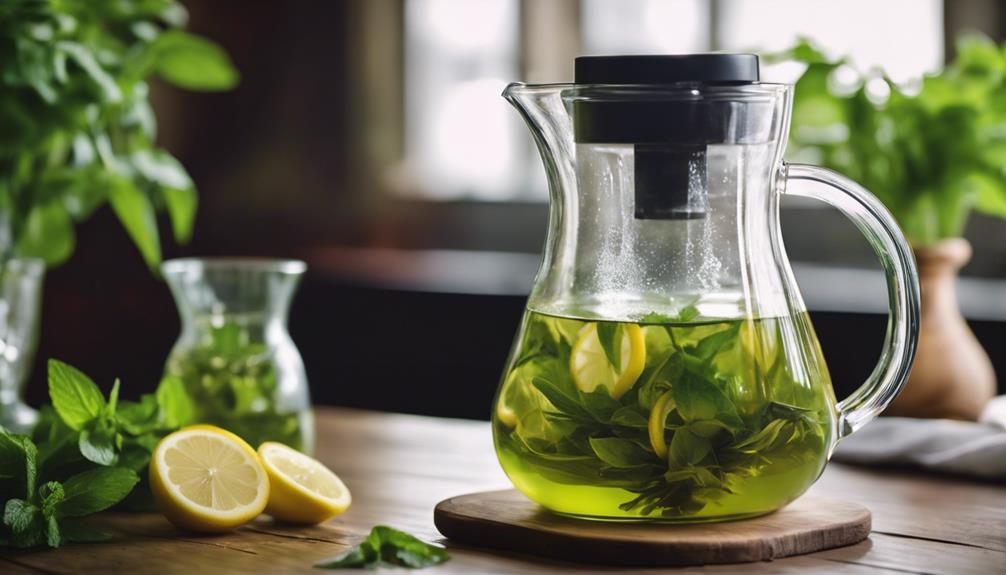
Explore a variety of green tea infusion ideas to add an invigorating twist to your daily beverage routine.
Try the zesty Green Tea Lemon Elixir for a burst of citrusy flavor, or opt for the soothing warmth of a Lemon Ginger Green Tea blend.
For a creamy treat, consider whipping up a velvety Lemon Matcha Latte recipe that combines the earthy notes of matcha with the bright tang of lemon.
Green Tea Lemon Elixir
To enhance the flavor of your green tea, consider infusing it with fresh lemon for an invigorating twist on your daily beverage. The Green Tea Lemon Elixir not only adds a zesty kick but also boosts the health benefits of your drink.
Here are some ideas to elevate your green tea with lemon:
- Health Benefits: Lemon is rich in vitamin C and antioxidants, enhancing the immune system and aiding digestion.
- Flavor Profile: The citrusy notes of lemon complement the earthy tones of green tea, creating a revitalizing and balanced taste.
- Nutritional Value: This infusion adds minimal calories while providing additional nutrients like potassium and fiber.
- Serving Suggestions: Enjoy your Green Tea Lemon Elixir hot or cold, sweetened with honey or stevia for a guilt-free treat.
- Variations: Experiment with adding mint leaves or ginger for extra layers of flavor in your green tea elixir.
Elevate your daily green tea routine with the invigorating Green Tea Lemon Elixir and experience a burst of freshness in every sip.
Lemon Ginger Green Tea
Enhance your green tea experience by infusing it with the vibrant flavors of lemon and ginger for a revitalizing twist on your daily beverage. Lemon Ginger Green Tea offers a delightful combination of citrusy zest and warming spice that not only tantalizes your taste buds but also provides a host of health benefits.
- Lemon Ginger Benefits: This infusion is known for its digestive aid properties and immune-boosting effects. The lemon adds an invigorating tang while the ginger imparts a subtle heat, creating a harmonious blend that soothes the senses.
- Flavor Profile: The bright, citrusy notes of lemon complement the earthy undertones of green tea, while the ginger adds a hint of warmth and complexity to the overall flavor profile.
- Health Benefits: Lemon and ginger are both rich in antioxidants and vitamins, promoting overall well-being and aiding in weight loss.
- Weight Loss: The combination of lemon and ginger in green tea can help boost metabolism and aid in digestion, making it a supportive addition to a balanced diet for those aiming to lose weight.
- Enjoy the benefits of Lemon Ginger Green Tea by incorporating it into your daily routine for a revitalizing and healthful beverage option.
Lemon Matcha Latte Recipe
Revitalize your green tea experience with an invigorating twist by trying out a zesty Lemon Matcha Latte recipe. Combining the earthy richness of matcha with the vibrant citrus notes of lemon creates a delightful fusion that will awaken your taste buds and provide a multitude of health benefits.
- Matcha benefits: Matcha is a powdered green tea that's packed with antioxidants, boosts metabolism, and enhances focus and concentration.
- Lemon health benefits: Lemons are a great source of vitamin C, aid digestion, promote hydration, and support weight loss.
- Flavor explosion: The combination of matcha's slightly bitter undertones with the invigorating tartness of lemon creates a harmonious balance of flavors.
- Easy preparation: This Lemon Matcha Latte recipe is simple to make and can be enjoyed hot or cold, depending on your preference.
- Versatile beverage: Whether you need a morning pick-me-up or a mid-afternoon energy boost, this Lemon Matcha Latte is the perfect choice for a flavorful and healthful drink.
Brewing Green Tea Perfectly
To brew green tea perfectly, start by paying attention to the water temperature; it should be around 175°F for the best results.
Next, consider the steeping time – about 2-3 minutes for a delicate flavor or 3-4 minutes for a stronger taste.
Water Temperature Importance
Maintaining the ideal water temperature is vital for achieving the perfect brew when making green tea. Temperature control plays a significant role in extracting the health benefits and flavors from the tea leaves. Using water that's too hot can result in a bitter taste, while water that's too cool may not bring out the full range of flavors.
To guarantee the best outcome, start by heating the water to around 175-180°F (80-82°C) for green tea. This temperature range allows for the delicate leaves to release their flavors without becoming overly bitter.
Additionally, using high-quality water is important as it can impact the overall taste of the tea. Water with impurities or a strong taste can alter the flavor extraction process.
Steeping Time Consideration
For the ideal green tea brew, the steeping time is an essential element to keep in mind in order to extract the desired flavors and health benefits effectively.
Different steeping techniques can influence the flavor profiles and health benefits of green tea. The ideal steeping time for green tea is typically around 2-3 minutes. Steeping for too long can result in a bitter taste due to increased caffeine content, while steeping for too short a time may not extract all the beneficial compounds.
Green tea contains various health benefits, such as antioxidants that help in reducing inflammation and improving heart health. The caffeine content in green tea also provides a gentle energy boost without the jitters often associated with coffee.
Lemon Zest Enhances
Enhancing your green tea brew with lemon zest can add an invigorating citrusy twist to elevate the overall flavor profile. Lemon benefits your body with a rich source of vitamin C, antioxidants, and aids in digestion.
When paired with green tea, the zesty lemon essence complements the earthy notes of the tea, creating a harmonious blend of flavors.
To incorporate lemon zest into your green tea brewing process, simply add a few strips of lemon peel to your tea leaves before steeping. The natural oils in the zest infuse the hot water with a revitalizing citrus aroma, enhancing the taste of your tea.
This flavor pairing not only enhances the taste of your green tea but also provides a host of health benefits. The combination of green tea and lemon can boost your metabolism, aid in weight loss, and improve your overall well-being.
Final Thoughts
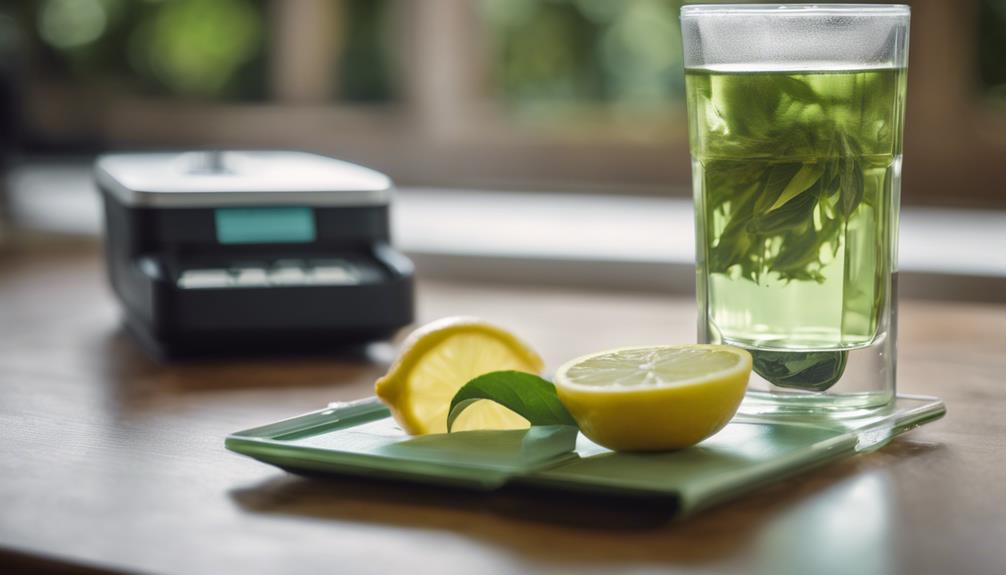
Consider reflecting on your overall experience with incorporating Sous Vide Green Tea with Lemon into your 1200 calories a day diet. The flavor combinations of the green tea with a hint of lemon zest not only tantalize your taste buds but also provide an invigorating twist to your daily routine.
As you savor each sip, you may have noticed the health benefits that come with this simple yet powerful drink. Green tea is rich in antioxidants that can boost your metabolism and aid in weight loss, while the addition of lemon adds a zesty touch of Vitamin C, promoting wellness benefits for your immune system.
Throughout your journey of consuming Sous Vide Green Tea with Lemon on your 1200 calories a day diet, you may have experienced the positive effects it has on your overall well-being. The combination of weight loss properties from green tea and the immune-boosting qualities of lemon creates a dynamic duo that supports your health goals.
As you continue to enjoy this flavorful beverage, remember that small changes like this can make a significant impact on your journey to a healthier lifestyle. Cheers to your commitment to nourishing your body and mind with this delightful drink!
Conclusion
To sum up, incorporating sous vide green tea with lemon into your 1200 calorie a day diet can be an invigorating and low-calorie way to stay hydrated and reap the benefits of green tea.
With its origins dating back centuries and various varieties to choose from, green tea is a versatile and healthy option to support your weight loss goals.
Remember to brew your tea properly to maximize its flavor and benefits.
Enjoy your cup of green tea and lemon!
